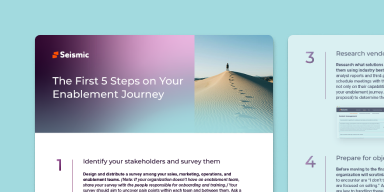ENABLEMENT
Seismic Resources Center
Explore our knowledge center to learn about all things enablement. Check out the latest ebooks, best practice guides, videos and more.

Enablement Explanations
Just getting started? See our explainers to get up to speed on any and all aspects of enablement.
Collections
We’ve brought together articles, videos, and thought leadership content about key topics of interest. Check out a hub to dig deep and learn.
FAQs and Glossary
Feeling a little lost? Read our short FAQs on the most common enablement questions. Or look up terms in our Glossary.
Filter by

REPORTS
Generation Enablement Report: The Rise of Enablement’s Influence
Discover the behavior and beliefs of Generation Enablement in Seismic’s latest first-party research study, Generation Enablement Report: The Rise of Enablement’s Influence.

REPORTS
Spring 2024 G2 Enterprise Grid® for Sales Enablement Software
See why Seismic was named a leader in enterprise businesses in G2’s latest report.

EBOOKS
Enablement in Financial Services
Learn how firms around the world leverage enablement tech to reach new heights of success.

WHITEPAPERS
The Seismic Advantage (Financial Services)
Discover Seismic’s robust security measures and its commitment to privacy, governance, and compliance.

WHITEPAPERS
The Seismic Advantage
Discover Seismic’s robust security measures and its commitment to privacy, governance, and compliance.

ON-DEMAND WEBINARS
Seismic’s Winter Release ‘24 Preview
Craving a look at Seismic’s Winter product innovations? Check out this webinar to see features demoed in action, learn how to implement them into your tenant, and gain insight on how to roll them out successfully at your organization.

GUIDES
The First 5 Steps on Your Enablement Journey
Ready to kickstart your enablement journey? Start with these five steps.

GUIDES
4 ways to master go to market chaos
Take charge of your go-to-market efforts with enablement.

EBOOKS
Kick Go-to-Market Chaos to the Curb
Enablement makes it easy to onboard faster, train better, find content quicker, and measure impact.